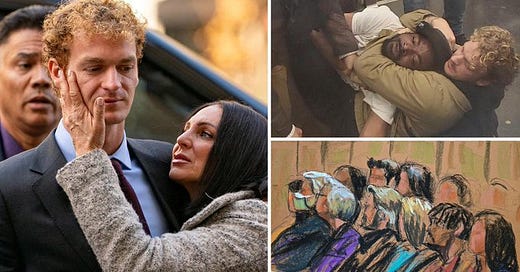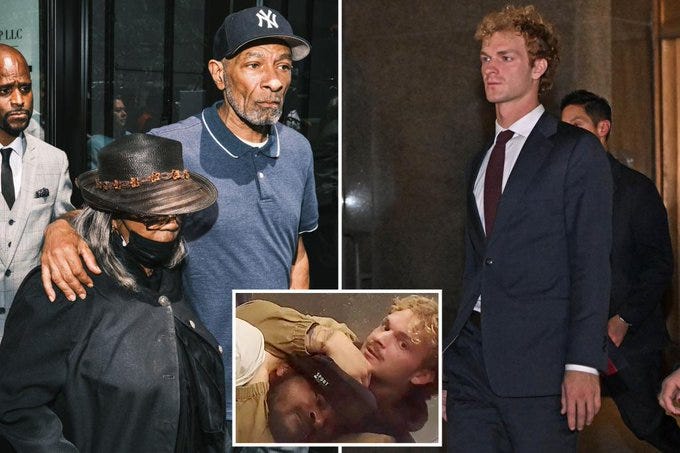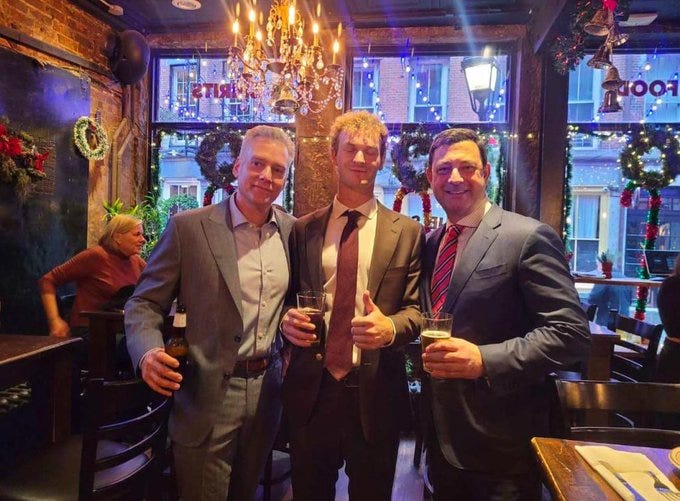🛡The F Train Incident: A Story of Two Lives That Crossed Paths and Changed Forever
DANIEL PENNY ACQUITTED IN NY SUBWAY DEATH OF JORDAN NEELY
On a spring afternoon in New York City, as the F train rumbled beneath the streets of Manhattan, two men's lives intersected in a way that would spark national debate and end in tragedy. It was May 1, 2023, and the subway car carried its usual mix of commuters, each lost in their own world of headphones and smartphone screens.
Daniel Penny, a 26-year-old former Marine studying architecture, was heading to his gym near the Flatiron building. Like many New Yorkers, he'd made this journey countless times before, his earbuds providing a soundtrack to the familiar subway rhythm.
At the Second Avenue station, Jordan Neely entered the train. At 30 years old, Neely was known to some New Yorkers as a Michael Jackson impersonator who once brought joy to passersby with his dance moves. But life had dealt him harsh blows – the brutal murder of his mother when he was just 14 had sent him on a downward spiral, leading to struggles with mental illness and homelessness.
That afternoon, witnesses would later testify, Neely threw down his jacket and began shouting. Eight passengers would tell the court that his words spoke of death and jail, though none would testify that he physically threatened anyone specific. The atmosphere in the car grew tense as passengers, including a young mother with her child, watched the scene unfold.
Within moments, Penny made a decision that would change both their lives forever. He rose from his seat and approached Neely from behind, wrapping his arm around the man's neck in a move he'd learned during his Marine training – though his former instructor would later testify it wasn't applied correctly.
The train reached Broadway-Lafayette station within 30 seconds, and passengers fled to the platform. But on the floor of that subway car, the struggle continued. Two other men joined in – Eric Gonzalez, a 39-year-old casino room manager who had been waiting on the platform, and a tourist from Germany who would later decline to testify.
For almost six minutes, as captured on video by journalist Juan Alberto Vasquez, the scene played out. Neely struggled, at one point reaching up to tap the leg of the German tourist in what appeared to be a plea for help. His movements gradually weakened until, finally, they stopped altogether.
"You gotta let him go," witness Larry Goodson warned, concerned about what he was seeing. "My wife is ex-military. You going to kill him now."
When police arrived, they found Neely unresponsive. He would never regain consciousness.
The case quickly became a lightning rod for debates about vigilantism, mental health care, and public safety. Some saw Penny as a good Samaritan stepping in to protect his fellow passengers. Others saw a tragic example of excessive force against a mentally ill man who needed help, not violence.
In the courtroom, these competing narratives played out over weeks of testimony. Prosecutors argued that while fear of Neely's behavior might have been valid, the extended chokehold crossed a line into criminality. The defense painted a picture of a broken system that had failed Neely long before that day on the F train, arguing their client had acted to protect others when no better options existed.
When the verdict came down on Monday, it brought closure to the criminal case but left deeper questions unanswered. Daniel Penny was found not guilty of criminally negligent homicide, after the more serious manslaughter charge had been dismissed.
Outside the courthouse, two groups gathered – one celebrating what they saw as justice served, the other protesting what they viewed as justice denied. Neely's father, Andre Zachery, surrounded by family and supporters, expressed his pain: "It hurts. It really, really hurts. What are we gonna do, people? What's gonna happen to us now?"
The story of that afternoon on the F train has become more than just a criminal case. It has become a mirror reflecting some of society's most challenging questions: How do we balance public safety with mental health care? When is intervention justified, and who gets to make that call? What do we owe to each other as human beings sharing the same city spaces?
While the criminal case has concluded, these questions remain. A civil suit filed by Neely's father ensures the legal journey isn't over. But beyond the courtroom, the tale of two men whose paths crossed on a subway train continues to resonate, challenging us to grapple with issues that extend far beyond that single afternoon in May.
BLM Protesters flood the streets of New York City, chanting "No Justice, No Peace!" following Daniel Penny’s acquittal in the subway chokehold case.






